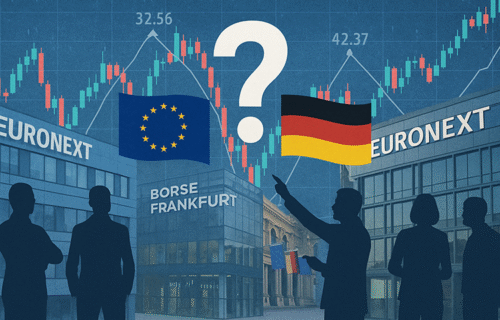A proposal to merge Europe’s fragmented stock exchanges into one unified market is dividing opinion across the continent. Backed by Germany and supported by Euronext, the initiative aims to create a single European exchange capable of competing with New York and Asian financial centres. Yet while the idea carries symbolic and strategic weight, experts remain sharply divided over whether it can actually deliver the liquidity, efficiency, and investor confidence Europe seeks.
German Chancellor Friedrich Merz reignited the debate in mid-October, calling for a European stock exchange that would give continental companies more reason to list at home rather than abroad. The call quickly drew support from Euronext, whose CEO, Stéphane Boujnah, described the plan as a necessary step to end Europe’s fragmented capital markets and boost its global standing.
Supporters argue that combining the continent’s largest trading hubs—from Paris and Amsterdam to Frankfurt and Milan—would create the scale needed to keep leading firms from seeking listings in the United States. They frame the proposal as part of Europe’s broader effort to deepen financial integration and complete its long-promised Capital Markets Union. Advocates also suggest that a shared platform could reduce costs, standardise regulation, and attract international investors, strengthening Europe’s hand in the global financial system.
But critics question whether such a consolidation can fix Europe’s deeper structural challenges. Analysts point out that fewer European companies are going public, trading volumes remain low, and investors continue to view U.S. markets as more liquid and dynamic. Simply merging exchanges, they warn, won’t reverse those trends. Others highlight the political and regulatory hurdles: each member state has its own financial watchdog and laws governing securities, and handing greater oversight to Brussels or the European Securities and Markets Authority would mean surrendering a degree of national control—an idea likely to face resistance from smaller countries.
Some observers fear that the plan could benefit only the largest economies and institutions, leaving smaller national exchanges behind. They argue that Europe’s focus should be on stimulating entrepreneurship and investment, rather than restructuring market infrastructure.
Despite the uncertainty, the discussion has injected new urgency into Europe’s long-standing effort to integrate its financial systems. For policymakers, the question is no longer just about whether Europe can create a single stock exchange, but whether doing so will truly make its capital markets stronger, more resilient, and more competitive on the world stage.
If successful, the project could redefine how Europe raises and allocates capital. If not, it risks becoming another ambitious vision stalled by the very fragmentation it seeks to overcome.
